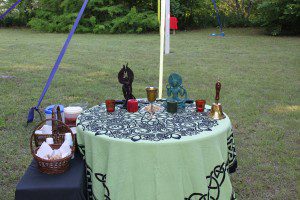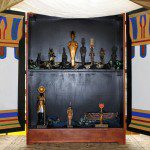 Over on the Patheos Atheist channel, Bob Seidensticker has a good piece titled Your Religion Is a Reflection of Your Culture—You’d Be Muslim if You Were Born in Pakistan. There’s a very strong correlation between the religion of birth and the religion practiced as an adult. Conversions do happen (I’m proof of that) but they’re fairly rare, particularly outside the West.
Over on the Patheos Atheist channel, Bob Seidensticker has a good piece titled Your Religion Is a Reflection of Your Culture—You’d Be Muslim if You Were Born in Pakistan. There’s a very strong correlation between the religion of birth and the religion practiced as an adult. Conversions do happen (I’m proof of that) but they’re fairly rare, particularly outside the West.
I came to pretty much the same conclusion many years ago – it’s the biggest reason I could not remain in Evangelical Christianity and became a universalist, the path that would eventually lead me to Paganism, Druidry, and Unitarian Universalism. The odds on salvation vs. damnation are highly dependent on where and when you’re born, and that gross unfairness is incompatible with a God who is supposedly both all-powerful and all-loving.
Seidensticker’s piece is good, but I want to explore the implications of one of the comments made by someone using the name MrCorvus:
IMO, logically, either all religions are correct (many paths to God) or they are all wrong (religion is man-made).
The other option, that one religion is correct and all the others are wrong, doesn’t make any sense to me. It would imply that an all-powerful, loving God decided that the fate of your eternal soul would come down to a crap shoot on where and how you happened to be born and raised.
This is a question of theology – the study of the nature of the Gods. There’s a been a bit of an uptick in postings on Pagan theology lately. Sable Aradia has a nice recap, which includes my piece on the Four Centers of Paganism, though I see the Four Centers as a work of religious studies, not theology.
Last week on PaganSquare, Gus diZerega wrote about Why Pagan theology is so unimportant among Pagans. If we lived in a Pagan bubble, perhaps Gus would have a fair point – but we don’t. We live in a culture that is saturated with Christian assumptions, something MrCorvus’ comment illustrates perfectly. He sees only three possibilities:
- one God, one way – the conservative Christian position
- one God, many ways – the universalist Christian position
- no God, no ways – the atheist position
 There are two unstated assumptions here, both of which flow out of our nominally-Christian culture. The first is the assumption that either there is one God or there is no God. The polytheist option – that there are many Gods – is never considered. Perhaps MrCorvus has the Victorian attitude that polytheism is something primitive that all good educated people have abandoned, but more likely he’s simply never given the idea of many Gods the first thought.
There are two unstated assumptions here, both of which flow out of our nominally-Christian culture. The first is the assumption that either there is one God or there is no God. The polytheist option – that there are many Gods – is never considered. Perhaps MrCorvus has the Victorian attitude that polytheism is something primitive that all good educated people have abandoned, but more likely he’s simply never given the idea of many Gods the first thought.
Pagans don’t proselytize and we have no need to convert MrCorvus or anyone else. But he is representative of the general population from which we draw, and the society in which we live and work. How many people hear the call of the Gods but will never respond because they can’t imagine that Athena and Odin and Morrigan are anything more than characters in some old stories?
Getting good Pagan theology into mainstream conversations lets everyone know there are more possibilities than one God or none. Many Gods is another option.
The second unstated assumption is that any religion must either be correct or wrong, with the most important question being what happens after death. Christianity is – at least in its conservative forms – a death-preparing religion. It’s about “getting right with God” so you’ll go to heaven when you die. What you do in this life is only important to the extent it prepares you for death, whether that means holding the right belief, belonging to the right church, or performing the right actions.
What’s never considered is that perhaps what’s most important isn’t what happens after death but what we do here in this life. Our ancient pagan ancestors developed the field of philosophy to address this question: how should we live? Paganism is a life-affirming religion.
There can be no objective certainty in religious matters. We all have reasons why we believe and practice what we believe and practice, but at best we have evidence to support what we think and feel is right. We never have proof. Neither does anyone else.
 So rather than asking if a religion is correct or wrong, a Pagan or a polytheist would ask if a religion is more helpful or less helpful… or in some cases, if it’s harmful. Does it help you connect to other people, other generations, and other species? Does it help you connect to the Gods and Their virtues and values? Does it help you identify your core values and then live in harmony with them? Does it help you live in ways that are responsible and sustainable? Does it help you deal with the Big Questions of Life? And perhaps most importantly, does it help you live a meaningful life?
So rather than asking if a religion is correct or wrong, a Pagan or a polytheist would ask if a religion is more helpful or less helpful… or in some cases, if it’s harmful. Does it help you connect to other people, other generations, and other species? Does it help you connect to the Gods and Their virtues and values? Does it help you identify your core values and then live in harmony with them? Does it help you live in ways that are responsible and sustainable? Does it help you deal with the Big Questions of Life? And perhaps most importantly, does it help you live a meaningful life?
There is reason to doubt the historicity of the Marcus Aurelius quote I see on Facebook from time to time, but it’s still true:
Live a good life. If there are Gods and they are just, then they will not care how devout you have been, but will welcome you based on the virtues you have lived by. If there are Gods, but unjust, then you should not want to worship them. If there are no Gods, then you will be gone, but will have lived a noble life that will live on in the memories of your loved ones.
Bob Seidensticker is right: your religion is a reflection of your culture. And Western culture is filled with Christian assumptions, many of them unstated. If we are to make Paganism and polytheism accessible to ordinary people who need and want what our religions offer, we’re going to have to challenge unstated assumptions like these, and we’re going to have to offer well-reasoned, well-articulated alternatives.
And that’s one of the reasons Pagan theology is so important.
















